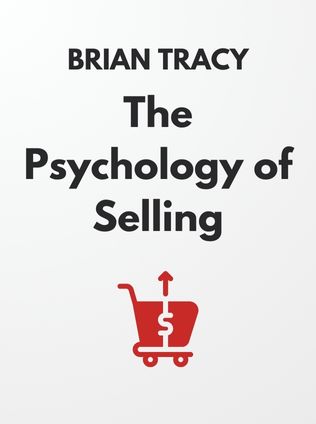
The Psychology of Selling
Increase Your Sales Faster and Easier Than You Ever Thought Possible
By Brian Tracy
Published 08/1988
About the Author: Brian Tracy
Brian Tracy is a name synonymous with success, motivation, and excellence in personal development and sales training. Over the past few decades, Tracy has influenced millions through his books, seminars, and corporate training programs. Born in Canada in 1944, Tracy did not come from wealth or privilege; his early life was marked by struggle and hardship. This challenging background instilled in him a deep understanding of the principles of hard work, resilience, and the power of self-discipline—principles that would later form the foundation of his teachings.
Tracy's career in sales began in the 1960s when he worked as a door-to-door salesperson. It was during this time that he became fascinated by the psychology behind why people buy and what differentiates top salespeople from the rest. His curiosity and commitment to learning propelled him to the top of his field, and soon he was leading a sales force of over 95 people. Tracy’s success in sales was not just about natural talent; it was the result of a systematic approach to personal and professional growth, something he passionately shares in his work.
As an author, Tracy has written over 70 books, many of which have become bestsellers. His works have been translated into dozens of languages, making his ideas accessible to a global audience. "The Psychology of Selling," first published in 1984, remains one of his most influential works, offering timeless insights into the art and science of sales. In this book, Tracy distills decades of experience into actionable strategies that salespeople can use to achieve greater success. He emphasizes the importance of mindset, goal setting, and understanding customer psychology—all of which are crucial for anyone looking to excel in the competitive world of sales.
Main Idea
The core premise of "The Psychology of Selling" is that successful selling is as much about understanding yourself as it is about understanding your customers. Tracy argues that the psychology behind selling is the key to unlocking consistent sales success. This involves cultivating a winning mindset, mastering the techniques of selling, and continuously improving one's skills. Tracy's philosophy is built around the idea that small, consistent improvements in key areas can lead to dramatic increases in sales performance over time.
Tracy introduces the concept of the "winning edge," which he describes as a small advantage that top salespeople have over their competitors. This edge could be a slightly better way of handling objections, a more refined approach to prospecting, or a deeper understanding of customer psychology. According to Tracy, these small differences, when consistently applied, can make a significant impact on overall success.
In addition to mindset, Tracy emphasizes the importance of goal setting. He believes that the most successful salespeople are those who have clear, specific goals and a plan to achieve them. Without goals, it’s easy to drift and lose focus. Tracy's approach to sales is both strategic and psychological, making it a comprehensive guide for anyone serious about improving their sales skills.
Table of Contents
- Introduction: The Power of Selling
- The Psychology Behind Successful Salespeople
- Developing a Winning Attitude
- The Power of Goal Setting
- Understanding Customer Psychology
- Prospecting Techniques
- Handling Objections and Closing the Sale
- Advanced Selling Techniques
- Creative Selling
- Conclusion: The Road to Sales Mastery
The Psychology Behind Successful Salespeople
In the opening chapters of the book, Tracy delves into the psychology that separates top salespeople from the rest. He highlights a staggering statistic: only 20 percent of salespeople make 80 percent of the sales. This phenomenon, known as the 80/20 rule, underscores the disparity in performance within the sales profession.
Tracy argues that the key to joining the top 20 percent lies in developing a "winning edge." This edge is not about major differences in skill or knowledge but rather about slight advantages consistently applied. He likens this to a horse winning a race by a nose but earning ten times the prize money of the second-place finisher. The lesson here is that small improvements can lead to significant gains.
“Success is the result of small, consistent actions over time.” - Brian Tracy
Tracy emphasizes that this winning edge begins with a positive self-concept. Your self-concept shapes how you perceive yourself and your abilities, directly influencing your behavior and, consequently, your results. A salesperson with a strong self-concept believes in their ability to succeed and is more likely to persist in the face of challenges. This belief system is critical because, as Tracy notes, "you are what you think." Developing a positive attitude towards yourself and your capabilities is the first step toward achieving extraordinary results in sales.
Developing a Winning Attitude
A key theme in Tracy's book is the importance of attitude in sales success. He explains that your attitude towards yourself, your product, and your customers profoundly impacts your ability to sell effectively. A positive attitude can be the difference between success and failure, as it influences how others perceive you and how you approach your work.
Tracy outlines three main benefits of cultivating a positive attitude:
Sign up for FREE and get access to 1,400+ books summaries.
You May Also Like
The Subtle Art of Not Giving a F*ck
A Counterintuitive Approach to Living a Good Life
By Mark MansonRich Dad Poor Dad
What the Rich Teach Their Kids About Money - That the Poor and Middle Class Do Not!
By Robert T. KiyosakiHow To Win Friends and Influence People
The All-Time Classic Manual Of People Skills
By Dale CarnegieFreakonomics
A Rogue Economist Explores the Hidden Side of Everything
By Steven D. Levitt and Stephen J. Dubner



















